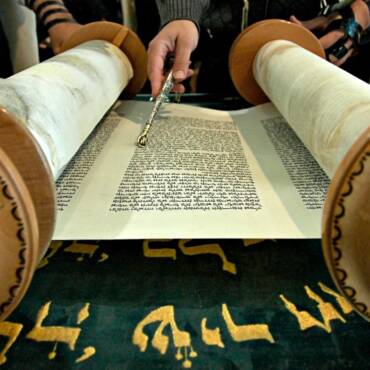Forever in the Book of Life
The High Holy Days are here again! Rosh Hashanah will begin the evening of September 13th, and Yom Kippur (the Day of Atonement), the evening of September 22nd. These holy days are observed as days of solemn personal evaluation of one’s soul before God. In the traditional Jewish community, Rosh Hashanah is seen as the Day of Judgment: when God evaluates an individual’s deeds to determine whether He will write that person’s name in the Book of Life for the coming year (Talmud, Rosh Hashanah 16a).
The Open Books
According to tradition, on Rosh Hashanah three books are opened before God in heaven. One book is for the absolutely wicked. Their names will not be written in the Book of Life for the coming year. Another book is for the perfectly righteous. Their names will definitely be included for the year (This book couldn’t be very big!) Finally, the third book is opened for those ordinary people who are neither perfectly evil nor perfectly good.
After the books are opened on Rosh Hashanah, people have ten days to do good deeds to merit being placed in the Book of Life for the coming year. These ten days are called “the Days of Awe” and they end at Yom Kippur. On Yom Kippur, people return to synagogue in order to repent of their sins with the hope that they have been forgiven by God and that their good deeds have been sufficient for their names to be written into the Book of Life for the coming year.
Therefore, on Yom Kippur, to be made right with God is the desire of every religious Jew. It is believed that repentance with fasting, charity, and good deeds produces forgiveness. Though fasting on Yom Kippur is not a specific scriptural command, the day is so commonly identified with the practice that it is simply called, “the fast,” in the New Covenant (Acts 27:9).
The Need for Forgiveness
Yet, however sincere a person may be in their fasting and good deeds, these things are never stated in Scripture to be enough to merit forgiveness of sins. Instead, God’s provision for a person to be forgiven and restored to Himself has always been by means of vicarious blood atonement. Today, however, this concept is considered archaic by most people, including those in traditional Judaism.
Some rabbis contend that the Bible provides a way of atonement without a bloody sacrifice, even in biblical times. At any rate, with the destruction of the Temple by the Romans in AD 70, there has been no acceptable place for blood sacrifice. Thus, the rabbis have concluded that from this point on, God no longer required blood sacrifice for the forgiveness of sins. But what does Scripture say on this subject? The texts are clear:
“For the life of the flesh is in the blood, and I have given it to you on the altar to make atonement for your souls; for it is the blood by reason of the life that makes atonement.” – Lev. 17:11
Has God changed His view of sacrifice, or have we merely changed our view of sin? Perhaps people have accepted an idea of sin as a minor infraction, where a day of fasting is seen as sufficient to get right with God. However, is this acceptable to God, the offended party? He states that sin is awful and catastrophic to His honor, our well-being, and our relationships. Since His view on sin has not changed, neither should our view of sacrifice. To offend an eternal God’s holiness is an eternal offense, and therefore requires an atonement of life. Thus, while the topic of blood sacrifice may seem bizarre or primitive, it is meant to teach us the real horror of sin: sin kills.
God’s Provision for Forgiveness
Before the Temple was destroyed and the means of animal sacrifice no longer available, God provided One who is “greater than the Temple” (Matthew 12:6), the Messiah whose death would provide the final sacrifice for sin. In fact, His was the sacrifice that all the animal sacrifices were pointing toward:
“For the law… can never with these same sacrifices, which they offer continually year by year, make those who approach perfect… For it is not possible that the blood of bulls and goats could take away sins… We have been sanctified through the offering of the body of Yeshua (Jesus) the Messiah once for all… For by one offering He has perfected forever those who are being sanctified.” – Hebrews 10:1-14
It would be wrong to conclude from the destruction of the Temple that blood atonement for forgiveness of sins is no longer required by God. Rather, the Messiah of Israel has come and made final and eternal atonement. That is why Yeshua declared from the cross, “It is finished.” (John 19:30). God wants restored relationships between Himself and all people, Jew and Gentile alike. For that, there has to be redemption by blood, repentance by the believer, and rest in His love and forgiveness. Do you have this? If not, come to Yeshua, our perfect sacrifice.
Written in His Book
It is not good deeds during the Days of Awe that will gain entrance into the Book of Life, but faith in God’s finished work of atonement in Messiah. By faith in Him, the New Year greeting: “L’shana tova tikatevu,” or “May you be inscribed (in the Book of Life) for a good year,” can be fulfilled in your life. May your name be, “written from the foundation of the world in the book of life of the Lamb who has been slain.” (Revelation 13:8)
God has promised life to those who by faith accept God’s way of salvation in Him; not only for the coming year, but for all eternity. (Rev. 13:8, John 17:3, John 3:16…)
“I came that they may have life and have it abundantly.” – John 10:10



